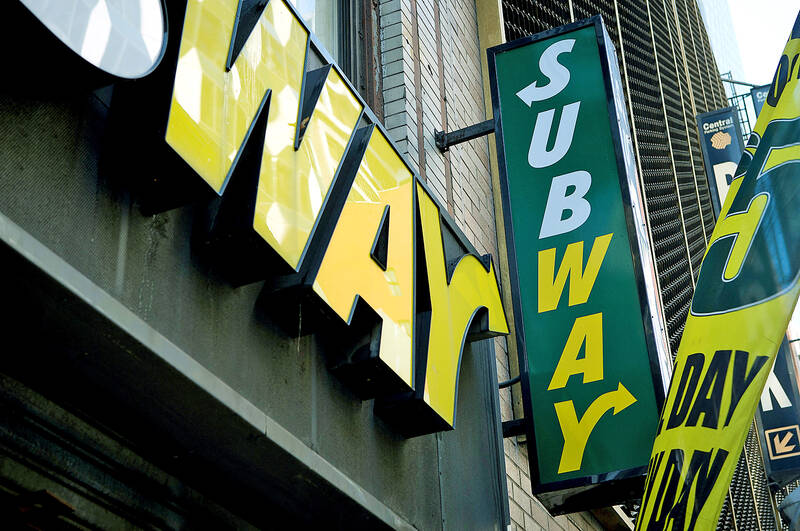Subway is exploring a potential sale that could value the sandwich chain at more than US$10 billion, a person familiar with the matter said.
The process is in its early stages and Subway could still decide against pursuing a sale, the person said.
“As a privately held company, we don’t comment on ownership structure and business plans,” Subway said in an e-mail. “We continue to be focused on moving the brand forward with our transformational journey to help our franchisees be successful and profitable.”

Photo: REUTERS
Subway has long been a potential target for private equity firms, as well as other corporations.
The company, based in Milford, Connecticut, is one of the world’s largest quick-service restaurant chains, with about 37,000 locations in more than 100 countries. Its rapid growth since opening its first shop in 1965 has in the past few years tapered off amid intense competition.
Subway’s deliberations were reported earlier by the Wall Street Journal.
In October last year, Subway said it had posted growth over the previous 18 months as the chain revamped its image with the “Eat Fresh” campaign that included new bread recipes, aimed at improving consumers’ perception of the chain and its ingredients.
The company said that digital sales, which include orders made online and via mobile apps, have bolstered results.
The momentum could help the company garner some interest following a difficult period in which it experienced management upheaval, criticism from franchisees and declining sales.
Subway is one of the most recognizable names in the restaurant industry, and its more than 20,000 US locations make it the largest by store count, dwarfing even McDonald’s Corp.
The company’s lack of drive-throughs hurt it during the COVID-19 pandemic, when many dining rooms were closed.
The company also endured a string of negative press, including its one-time pitchman being convicted for child pornography in 2015.
The Irish Supreme Court in 2020 ruled that Subway’s bread had too much sugar to be called bread.

SEMICONDUCTORS: The firm has already completed one fab, which is to begin mass producing 2-nanomater chips next year, while two others are under construction Taiwan Semiconductor Manufacturing Co (TSMC, 台積電), the world’s largest contract chipmaker, plans to begin construction of its fourth and fifth wafer fabs in Kaohsiung next year, targeting the development of high-end processes. The two facilities — P4 and P5 — are part of TSMC’s production expansion program, which aims to build five fabs in Kaohsiung. TSMC facility division vice president Arthur Chuang (莊子壽) on Thursday said that the five facilities are expected to create 8,000 jobs. To respond to the fast-changing global semiconductor industry and escalating international competition, TSMC said it has to keep growing by expanding its production footprints. The P4 and P5

DOWNFALL: The Singapore-based oil magnate Lim Oon Kuin was accused of hiding US$800 million in losses and leaving 20 banks with substantial liabilities Former tycoon Lim Oon Kuin (林恩強) has been declared bankrupt in Singapore, following the collapse of his oil trading empire. The name of the founder of Hin Leong Trading Pte Ltd (興隆貿易) and his children Lim Huey Ching (林慧清) and Lim Chee Meng (林志朋) were listed as having been issued a bankruptcy order on Dec. 19, the government gazette showed. The younger Lims were directors at the company. Leow Quek Shiong and Seah Roh Lin of BDO Advisory Pte Ltd are the trustees, according to the gazette. At its peak, Hin Leong traded a range of oil products, made lubricants and operated loading

Citigroup Inc and Bank of America Corp said they are leaving a global climate-banking group, becoming the latest Wall Street lenders to exit the coalition in the past month. In a statement, Citigroup said while it remains committed to achieving net zero emissions, it is exiting the Net-Zero Banking Alliance (NZBA). Bank of America said separately on Tuesday that it is also leaving NZBA, adding that it would continue to work with clients on reducing greenhouse gas emissions. The banks’ departure from NZBA follows Goldman Sachs Group Inc and Wells Fargo & Co. The largest US financial institutions are under increasing pressure

TRENDS: The bitcoin rally sparked by US president-elect Donald Trump’s victory has slowed down, partly due to outflows from exchange-traded funds for the token Gold is heading for one of its biggest annual gains this century, with a 27 percent advance that has been fueled by US monetary easing, sustained geopolitical risks and a wave of purchases by central banks. While bullion has ticked lower since US president-elect Donald Trump’s sweeping victory in last month’s election, its gains this year still outstrip most other commodities. Base metals have had a mixed year, while iron ore has tumbled, and lithium’s woes have deepened. The varied performances highlight the absence of a single, over-riding driver that has steered the complex’s fortunes, while also putting the spotlight